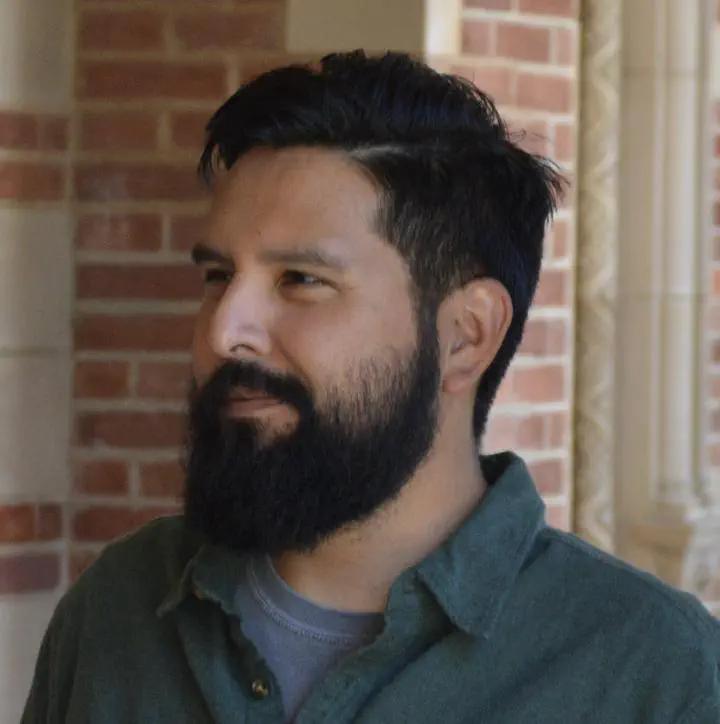Francisco Apen
 Professor Francisco Apen
Professor Francisco Apen
About
Dr. Francisco Apen is an Assistant Professor in the School of Earth and Sustainability at Northern Arizona University, where he joined the faculty in 2024. His research focuses on understanding the formation, evolution, and structure of continental lithosphere through advanced geochemical and geochronological techniques, with a particular emphasis on Earth’s earliest continental crust from the Archean eon.
Research Interests
Archean Continental Crust Formation
- Evolution of Earth’s first continents during the Archean eon (>2.5 billion years ago)
- Mechanisms of early continental crust generation and differentiation
- Geochemical signatures of Archean crustal formation processes
- Comparative studies across different cratonic regions
- Early Earth tectonics and crustal recycling processes
Continental Lithosphere Evolution
- Long-term structural and compositional evolution of continental lithosphere
- Heat production and thermal evolution of cratonic crust
- Lithospheric architecture and stability mechanisms
- Cratonic root formation and preservation
- Deep crustal processes and metasomatism
Petrology and Geochemistry
- Lower crustal xenolith studies and interpretation
- Major and trace element geochemistry of crustal rocks
- Mineral chemistry and phase equilibria studies
- Igneous petrology of cratonic basement rocks
- Metamorphic processes in deep crustal environments
Geochronology and Thermochronology
- U-Th-Pb thermochronology of accessory minerals
- Radiogenic isotope geochemistry applications
- Age dating of crustal formation and modification events
- Thermal history reconstruction of continental crust
- Integration of geochronological and geochemical datasets
Education
- Ph.D. Geochemistry, University of California, Santa Barbara
- B.S. Geology, University of California, Davis
Professional Experience
Academic Positions
- Assistant Professor, Northern Arizona University (2024-present)
- Presidential Postdoctoral Research Fellow, Princeton University (2022-2024)
- Thermal Ionization Mass Spectrometer Laboratory (TIMS Lab)
- Graduate Researcher, University of California, Santa Barbara
Research Impact
Dr. Apen has made significant contributions to understanding continental crust evolution with over 125 citations across his research publications. His work provides crucial insights into how Earth’s earliest continents formed and evolved over billions of years.
Major Research Projects
Continental Crust Heat Production Studies
- Heat-producing element contents of continental crust quantification
- U-Th-Pb thermochronology of accessory minerals in lower crustal xenoliths
- Thermal evolution modeling of cratonic lithosphere
- Heat transfer processes in deep continental crust
Multi-Cratonic Comparative Studies
- Tanzanian Craton - Lower crustal xenolith analysis
- Siberian Craton - Thermochronology and heat production studies
- Wyoming Craton - Continental lithosphere evolution
- Superior Craton - Archean crustal formation processes
Udachnaya Kimberlite Research
- Coupled U-Pb and trace-element analyses of accessory phases
- Crustal xenolith studies from Late Devonian Udachnaya kimberlite
- Deep crustal sampling through kimberlite-hosted xenoliths
- Siberian Craton architecture and thermal state
Research Methodologies
Analytical Techniques
- U-Th-Pb geochronology using thermal ionization mass spectrometry (TIMS)
- Major and trace element analysis by ICP-MS and electron microprobe
- Radiogenic isotope geochemistry (Sm-Nd, Rb-Sr, Lu-Hf systems)
- In-situ analysis of accessory minerals by LA-ICP-MS
- Numerical modeling of thermal and geochemical processes
Laboratory Expertise
- Thermal Ionization Mass Spectrometer (TIMS) operation and maintenance
- Clean laboratory techniques for ultra-low blank analysis
- Sample preparation for high-precision geochronology
- Data reduction and uncertainty propagation for geochronological datasets
Current Research Focus
Dr. Apen’s ongoing research emphasizes:
- Archean crustal differentiation processes and mechanisms
- Thermal evolution of continental lithosphere over geological time
- Integration of petrology and geochronology for crustal studies
- Comparative cratonic studies across different continental regions
- Early Earth dynamics and crustal recycling processes
Teaching and Student Training
Research Mentorship
- Undergraduate research opportunities in geochronology and petrology
- Graduate student training in analytical techniques and data interpretation
- Field work experience in sample collection and geological mapping
- Laboratory skills development in clean room and mass spectrometry techniques
Course Development
- Igneous and Metamorphic Petrology - Advanced undergraduate courses
- Geochronology and Isotope Geology - Graduate-level instruction
- Field Geology - Hands-on experience in geological observation and analysis
- Deep Time Earth History - Integration of geological and geochemical perspectives
Laboratory Facilities and Infrastructure
Analytical Capabilities
- Access to TIMS facilities through collaborative arrangements
- Sample preparation laboratories for geochronological analysis
- Microscopy and imaging capabilities for petrological studies
- Collaborative partnerships with major analytical facilities
Research Infrastructure
- Clean room facilities for ultra-low contamination sample processing
- Specialized equipment for mineral separation and analysis
- Computing resources for numerical modeling and data analysis
- International collaboration networks for sample exchange and research
Professional Service
Review and Editorial Activities
- Peer reviewer for geochronology and petrology journals
- Conference abstract review for professional meetings
- Grant proposal evaluation for funding agencies
- Student thesis examination and evaluation
Professional Organizations
- Geological Society of America - Active member and presenter
- American Geophysical Union - Geochemistry and petrology sections
- Mineralogical Society of America - Research contributions
- International Association of Geoanalysts - Analytical method development
Research Philosophy
Dr. Apen’s approach integrates cutting-edge analytical techniques with fundamental geological questions about Earth’s deep past. His research philosophy emphasizes the importance of high-precision geochronological and geochemical data in understanding the processes that shaped our planet’s earliest continental crust.
Future Directions
Dr. Apen’s research program at NAU will advance:
- Next-generation geochronological techniques for Archean studies
- Integrated petrological-geochemical approaches to crustal evolution
- Regional geological surveys of southwestern US Precambrian terranes
- Student training in advanced analytical geoscience techniques
- Collaborative research with international cratonic studies
Collaborative Research Networks
Dr. Apen maintains active collaborations with:
- Princeton University - Continued TIMS laboratory access and collaboration
- International researchers studying various cratonic regions
- Major analytical facilities worldwide for specialized techniques
- Field geology programs for sample collection and regional studies
Community Impact
Dr. Apen’s research contributes to:
- Fundamental understanding of early Earth processes and evolution
- Training of next-generation geochronologists and petrologists
- Advanced analytical capabilities in the southwestern United States
- International collaboration in deep time Earth science research
- Public education about Earth’s ancient history and formation